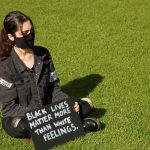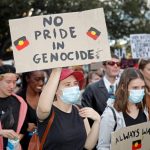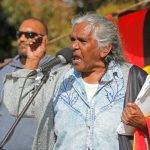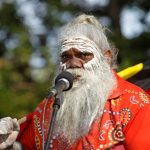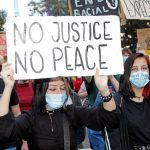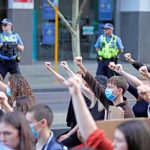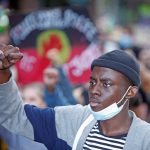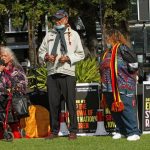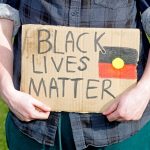When George Floyd died at the hands of police in the United States, Americans took to the streets and sparked global outrage. In Western Australia, thousands of people have supported the Black Lives Matter movement – online and via protests – even amidst the global COVID-19 pandemic. While Scott Morrison claimed this was an American issue not relevant back home, Australia disagreed and called out the more than 400 Indigenous Australians who have died in custody since the 1991 Royal Commission into Aboriginal Deaths in Custody.
According to The Guardian Australia’s Deaths Inside database, which tracks Indigenous deaths in custody since 2008, Indigenous Australians are ten times more likely to die in custody than non-Indigenous Australians. Shockingly, Western Australia has the worst statistics in the world when it comes to Indigenous deaths in custody, with 54 deaths in our state alone since The Guardian began tracking.
Injustice in the justice system
Dr Hannah McGlade, Senior Indigenous Research Fellow at Curtin University, gave a powerful and moving speech at a Black Lives Matter rally in Perth in June. She is a Nyungar woman and a human rights law researcher and advisor. In 2019 she was appointed Member of the United Nations Permanent Forum for Indigenous Peoples 2020-2023, representing Indigenous people of the Pacific region.
She said Indigenous people in Australia are being incarcerated at higher rates than non-Indigenous people, leading to more Indigenous deaths in custody.
“Thirty years ago there was a Royal Commission into Aboriginal Deaths in Custody that did find that Aboriginal people are dying at higher rates – and primarily this is because they’re being incarcerated at higher rates,” she said. “They also looked at the underlying reasons concerning incarceration and called on government to implement social justice reforms to address this.
“We know that more Aboriginal people are in jail because of our racial history of discrimination, oppression, dispossession and systemic forms of discrimination.”
Hannah said Aboriginal lives are unsafe in the justice system for a number of reasons.
“We know that Aboriginal people experience discrimination at every stage of the criminal justice system. And that’s been recognised by the former chief justice of the supreme court of WA, so this is no secret.
“There is a problem of racial profiling. Young people who are Aboriginal can be seen as criminal; Aboriginal women are often seen as criminal.
“This is a problem of society. This kind of racism is stereotyping. Aboriginals are seen as bad and dangerous people, and that stereotyping leads to police attention that can then result in charges that may not be valid.
“There are other stages in the justice system as well where Indigenous people can be treated in a harsher manner.”
Abolishing imprisonment for unpaid fines
Hannah said poverty can also be a contributing factor to prison over-representation for Indigenous Australians. Children have been arrested for stealing chocolate and lollies, and in the recent past, people were incarcerated for unpaid fines – a law which was abolished in June this year. The decision to end imprisonment for unpaid fines in WA will ave an effect on the rates of Indigenous deaths in custody, however, there is more work to be done.
The Uniting Church WA was part of the long-term campaign, and celebrated with other community groups such as Social Reinvestment WA.
“It was a recommendation thirty years ago in the Royal Commission because Aboriginal people are going to be more disproportionally impacted and incarcerated. They don’t have the means to pay fines, so that is a clear example of indirect and structural racism.
“This is a neutral law – if you don’t pay your fines you can end up going to jail. But that’s not neutral when some people are born into wealth, or have greater opportunity for wealth than Aboriginal people who have had less opportunity.
“It’s good, but we need to do a lot more. We need to look at the Australian Law Reform Commission Inquiry, Pathways to Justice. I was an advisor to that inquiry and we haven’t had a response to it from our State Government and none from the Federal either.
“There’s a lot of lip service. The State Government said they were going to reduce Indigenous incarceration, they’ve signed a reconciliation commitment. Unfortunately we’re not seeing the kind of expertise in Indigenous affairs in our state that we should be.”
History matters
Indigenous people in Australia have had a long history of racial injustice against them.
“We’ve had segregation here, we’ve had people denied land, land taken from them – we’ve had returned soldiers who were not given land like other non-Indigenous returned soldiers,” said Hannah.
“There’s discrimination throughout the justice system; very often it’s not acknowledged.
“We’ve had an apology by the Police Commissioner, yet at the same time, we saw a young Indigenous boy in handcuffs having his head slammed into concrete by police, in Perth.”
Systemic racism in Australia is rife, both in and out of the justice system. Where overt racism may be easy to spot and, perhaps, call out, systemic racism often happens without recognition.
Systemic racism happens when our institutions are set-up in a way that puts some at a racial disadvantage. It affects people in areas of housing, finance, education and in the justice system. It continues a cycle which keeps people disadvantaged. While overt racism is recognised as unacceptable these days, we still have a long way to go. Many of us may not be aware of the privilege we have, and some choose to deny they have it.
Not only is systemic racism an issue in Australia, it’s a contributing factor to the high number of Indigenous deaths in custody.
“[Systemic racism] is a little different to the individualised form of racism that we’re used to seeing when someone is individually abused in racial terms or denied an opportunity because of their race,” Hannah said.
“Systemic racism is more about the systems and the institutions and the way that racism happens in those systems or institutions, but in a way that is less overt.
“So it’s unrecognised, it’s structural. Sometimes it’s based on rules that seem neutral on their face, but will have a disproportionate impact.
“I think it’s also based on a system that is encompassing the dominant culture and not understanding of Indigenous people and the issues people are facing. And an unwillingness to learn as well.
“So at its core there’s a lack of respect for diversity, reconciliation and human rights.
“We often don’t talk about systemic racism in this country. Even though we’ve had a prohibition on indirect discrimination under the race discrimination and sex discrimination act for a long time, we haven’t really had a strong human rights culture.”
Raised awareness
In recent months, thousands of people have rallied in support of the Black Lives Matter movement in Australia, suggesting a shift in the way people are thinking about the issue.
“Clearly we’re having a change in society that’s about a people’s movement of increased awareness and understanding of non-Aboriginal Australians,” Hannah said. “It’s an exciting time, even though it’s sad because we know people’s lives are still being lost because of the way they’re treated for their race.
“The people’s movement is always the most critical movement for change. You can have laws, but if people don’t believe in those laws to bring about change and nondiscrimination then those laws are not given much effect.
“We’ve had discrimination laws in Australia since 1975 and yet discrimination is fairly common place.
“Black Lives Matter has really shone a light internationally on the issue of systemic state violence in a way that Australians have never seen before.
“So this was very eye-opening I think for a lot of Australians. I’ve been told that people who have never been socially active before did make a post about it or did come to a rally which is so fantastic.
“That passion that young people have to live a meaningful life, this is giving them some understanding for how they can contribute to that, and that’s really important.”
The Uniting Church in Australia has also come out in support of the Black Lives Matter movement, while staying cautious about the risks of large gatherings during the COVID-19 pandemic.
Dr Deidre Palmer, President of the Uniting Church in Australia and Pastor Mark Kickett, Interim Chairperson of the National Uniting Aboriginal and Islander Christian Congress (UAICC), issued a pastoral letter during Reconciliation Week to members of the church in response to George Floyd’s death in the United States, and asked for three things: for Uniting Church members to send a message of support to the UAICC; to update their Facebook profile pictures to add a ‘Uniting Church Against Racism’ frame; and to sign the ‘Change the Record’ campaign, calling for an end to the incarceration of, and family violence against, Aboriginal and Torres Strait Islander people.
“The Jesus we know from the Gospel stories, calls leaders to use their power in service to others, to call forth in others compassion, justice and kindness, unity and community. These are the leaders, we are called to be and that we need in the world today,” said Deidre.
In his letter, Mark related racially motivated events in America to events here in Australia.
“Here in Australia I am constantly reminded of the journey that First Peoples, my people, have had to endure and are continuing to endure, and yet the resilience of the First Nations continues to shine through such great adversity.
“Today, along with so many people and communities worldwide, I encourage us to be a light that shines upon the darkness of bigotry, racism, intolerance and hatred and to be that beacon of hope and life with a message of hope and peace that emanates from the Prince of Peace, our Lord and Saviour Jesus Christ.”
Lifelong trauma
It’s important to remember in all of this that each death that occurs in custody is not just a number; it’s a person who is loved by their sisters, brothers, children, parents, friends and community. The trauma endured by loved ones after a death in custody is a lifelong experience.
“It’s a really severe traumatic impact on the family who have a history of intergenerational trauma – we all do because all of our families were subject to these laws of segregation, assimilation and genocidal policies. It’s accumulative trauma,” said Hannah. “And I think that was really highlighted in the case of young Cherdeena Wynne. Her father died in custody 20 years before her and she was searching for answers. Was he murdered? Was there no justice?”
Cherdeena died in 2019 after being assaulted by police at her mother’s house in a case of mistaken identity.
“She was carrying that trauma of her father’s death when she was assaulted by police in her mother’s flat here in East Victoria Park,” Hannah continued. “Male police officers who violently assaulted her and traumatised her in a shocking way which you wouldn’t envisage if you were a non-Aboriginal person, because it just doesn’t happen to you. Nobody runs into the homes of non-Aboriginal families – particularly not in the wealthy suburbs or middle class suburbs of Perth – and attacks people like this.
“This is really an assault and attack on Aboriginal people’s bodies, minds, psyches, their lives – with no justice. The trauma of that is alive and lifelong.”
The road to change
Hannah said to create real change on this issue, Australia needs to implement the recommendations from the Australian Law Reform Commission report, Pathways to Justice.
“The report of the Australian Law Reform Commission is really critical,” she said. “Important recommendations were made about how we can start tackling this over-representation of Aboriginal people and discrimination in the justice system.
“One of the key recommendations was that states re-establish the Aboriginal Justice Advisory Committees. I believe this is absolutely critical to ensure focussed attention on the reforms that we need, being driven by Aboriginal people, consistent with self-determination and our own knowledge of these issues.”
As individuals, Hannah said there are a number of ways to create an impact. Ask your workplace if they have an active Reconciliation Plan and if they don’t, ask for one to be created. You can also contact your politicians and ask them to support Aboriginal human rights. Hannah also suggests to stay informed by learning more about the UN Declaration on the Rights of Indigenous Peoples, and supporting Aboriginal led movements for Treaty, constitutional reform, and addressing human rights goals.
“Be concerned, be informed and be active,” she said.
Learn more
Stay informed on Indigenous Deaths in Custody through Guardian Australia’s Deaths Inside database, which tracks Indigenous deaths in custody from 2008.
Keep up-to-date with the Black Lives Matter movement in Perth by following Boorloo Justice on Facebook and Instagram.
Find out more about systemic racism on The Conversation.
Learn more about the ending of imprisonment for unpaid fines.
Read the three requests and a prayer from the Uniting Church in Australia.
Look through the Indigenous Deaths in Custody Recommendations of the Australian Law Reform Commission.
Learn about the UN Declaration on the Rights of Indigenous Peoples.
Heather Dowling

